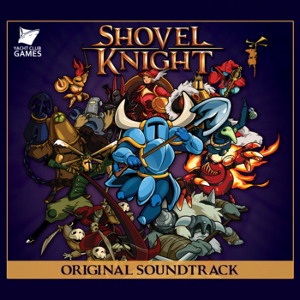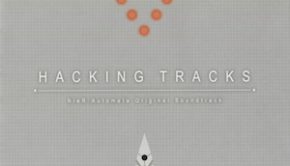Shovel Knight Original Soundtrack
 |
Album Title: Shovel Knight Original Soundtrack |
| Record Label: Big Lion Music |
|
| Catalog No.: N/A |
|
| Release Date: June 26, 2013 |
|
| Purchase: Download at Bandcamp |
Overview
Jake Kaufman is one of the few artists who might be more well-known for his music arrangements than his original compositions — at least originally. Kaufman switched over the past ten years from remixing video games to composing games like Contra 4, DuckTales Remastered, and Red Faction: Guerilla. Most recently, he composed a full-length chiptune score to the retro, 8-bit game Shovel Knight, a critically-acclaimed game developed and published by Yacht Club Games for the Wii U and Nintendo 3DS. The soundtrack, just like the game, is old school, but don’t let that deter you from giving it a listen. It is fun, insanely catchy, and brings back all kinds of memories from those wonderful old games that got us first noticing video game soundtracks.
Body
First, though, I want to talk about chiptunes for a minute. A wonderful development in games over the past few decades is the gradual shift from chiptune to synthesized instruments to actual recorded ensembles. I frequently think and write about the quality of instrumentation in soundtracks I hear; one talented violinist on a high-quality instrument can mask the mediocrity of the average composition. I am the first to buy a score simply because it was performed by one of my favorite orchestras or features my favorite instruments. I think the danger in this attitude comes in forgetting where the followers of video game soundtracks originated; it wasn’t in the lush scores of 2014, but in the retro 8-bit tracks of the eighties and nineties. When I think of a track that got in me into video game soundtracks, I think of Gameboy and SNES games like Pokemon, Zelda, Mario, Earthbound, and Kirby — games without instruments, but chiptunes. Originally, I saw the medium as the only option for composers; the technology didn’t exist for composers to use real instruments in their video games, and certainly it is be limiting for those wanting to use a live recording. Shovel Knight reflects, however, that this kind of music is iconic and of value in and of itself. Chiptunes represent a whole culture of video games and game music that is, or has been, fading; games like Shovel Knight bring it back in an impressive way.
Shovel Knight boasts a well-composed full-length score thanks to the talents of Jake Kaufman with forty eight tracks containing varied themes, moods, and 8-bit sounds that brings the listener back to the days of old-school gaming — although this soundtrack brings something new to the table. The first track begins the album on a strong note; recurring through the game, “Main Theme” captures the titular character Shovel Knight with all the triumph and fanfare of the music in any Game Boy game menu. Even this exposition of the theme features some variation. The sequence returns immediately in the second track, “Steel Thy Shovel,” in a more subdued, largo setting. The theme shows up in various places throughout the album and is present in a final realization during “End Credits,” in a strangely high-fidelity (but still great) setting.
Like any iconic old-school game, Shovel Knight contains plenty of solid level themes. “Strike the Earth! (Plains of Passage),” for example, is a heavily modified version of the main theme — heavily enough to sound different, but similar enough that it still sounds vaguely familiar and fits with the setting of the game as a whole. It also sounds like a classic overworld or level theme; it is interesting, but passive enough that it can be listened to multiple times without becoming tired. The theme in this game returns for “The Starlit Winds (Campfire Theme),” a softer and more delicate piece with rippling arpeggios taking over from the melody, which is more light and lilting than the “Strike the Earth” version.
Manami Matsumae, the composer of the original Mega Man and numerous other classics, contributed two tracks to Kaufman’s score, giving us a really exciting cameo addition to the soundtrack. “Flowers of Antimony (The Explodatorium)” opens with a more ominous tone boasting a chromatic scale and a pulsing beat before introducing the sinister chromatic theme almost a minute into the piece. This long development time builds up the drama and tension; once the melody is introduced, it’s easily picked up by the listener. The theme is creepily catchy, and while it almost ends too soon, luckily the melody returns in the following boss battle song. “The Vital Vitrol (Plague Knight Battle)” begins with something like a Pokemon battle opener and proceeds to a repeated chromatic scale and a transitional melody (fast enough to be almost double the tempo of “Flowers”) before the chromatic melody begins playing in the lower octaves of the piece; it’s as chilling as a chiptune can get, while still extraordinarily fun to fight to. While “Vitrol” is Kaufman’s creation, it is a complete remix of Matsumae’s “Flowers” theme.
The other theme Matsumae contributed first shows up in “A Thousand Leagues Below (Iron Whale)”, a piece very reminiscent of the old Mega Man soundtracks with its familiar-sounding syncopated melody, broken chords, tonal and chromatic key changes, and every melodic line except for the main theme being played with added thirds or fourths. I have a theory that the “whale level” in any video game (they seem to occur oddly frequently) is often one of the hardest, but also has some of the best music. Again, the theme returns in Kaufman’s “Treasure Hunter (Bounty Knight Battle),” but in a more accelerated meter. The rendition also includes more emphasized dissonance, and the melody has a far larger range, growing impossibly high before the track loops.
Throughout the game, Shovel Knight must defeat each of the eight knights belonging to the Order of No Quarter, and each member receives his own boss fight theme. Surprisingly, they’re pretty varied — a danger with creating individual themes for multiple enemies is that they begin to run together (as they did in Drakengard 3). However, whether it’s because each knight is different from the others, or simply because Kaufman was able to change the music drastically enough, each one sounds different. “The Rival (Black Knight – First Battle)” contains yet another variation of the “Strike the Earth” theme, but in a darker and more frantic setting; it’s lower in register, and the key has shifted to a minor one (although the theme reappears throughout the fight in its normal register, perhaps representing Shovel Knight in his battle against the Black Knight). “The Claws of Fate (Mole Knight Battle)” uses a very low bass ostinato, with simultaneous alto and baritone melodies, which lead into a much higher soprano parts.
Each of the eight levels progress similarly — a few level themes and a corresponding boss theme, although they by no means become repetitive.” The Halls of the Usurper” goes on the list of my top-three favorites on this album — it opens with a bright pattern of 8-bit beeps outlining a repeating energizing motif that proceeds to fall into a jazz-like melody without losing the rhythm of that opening. Many of the songs, like this one, take pieces from other musical genres to keep the soundtrack varied while sticking with the same medium. “Watch Me Dance” sounds like a polka, featuring a dotted note rhythm, and “The Schemer (Tinker Knight Battle)” sounds vaguely like 80s rave music. “The Apparition (Spectre Knight Battle)” has a fast-paced pseudo-waltz rhythm and is beautifully-implemented.
Naturally, Shovel Knight comes with a village theme, using counterpoint techniques to make the chiptune melody sound like a classic medieval game soundtrack out of the early nineties. This was one of the more nostalgia-inducing pieces for me; I felt as though I knew the theme while the first time I listened to it. There are three village themes; one for the main village, one for the interiors, and one for the basement. The pitches of the theme descends accordingly with each level of the village. Other similarly light-hearted songs appear on the album; “Spin Ye Bottle (Minigame)” is a quick and comically dark piece in a 2/4 meter, almost stereotypically Eastern European. Kaufman does not seem to let his audio options limit his compositions; instead, he seems to have approached it as an enjoyable challenge, to try and maximize the versatility of the soundtrack style he was given.
The Armorer Village tracks are my favorites. “Courage Under Fire” and “Bucklers and Bonnets” are the two insanely catchy themes of the village (one for inside, one for outside). I have been enjoying the theme of this village immensely; as with the other village theme, the main theme is in an alto-to-soprano range, and the interior theme is a baritone-to-alto range. Both themes use a constant eighth note rhythm underneath the quarter note melody; as simple as it sounds, it actually creates an effective movement and rhythm for the piece, keeping it steadily moving and interesting without detracting from the wonderful, childlike melody.
Summary
Kaufman’s soundtrack for Shovel Knight is a hugely enjoyable one, and worth checking out — particularly for those who grew up with those old 8-bit games. If nothing else, it certainly brings back memories. However, it also brings up this idea of chiptunes having innate value; as frivolous as the soundtrack may initially sound, it brings back a generation of games that has made a huge impact on the gaming world, suggesting that this generation is not yet gone. Shovel Knight‘s success reaffirms that there is a still-thriving market for these games, and Kaufman’s score is certainly worthy of being paired its game. The album is available on a name-your-price basis through Bandcamp, together with an arranged album, and is well worth checking out.
Do you agree with the review and score? Let us know in the comments below!
4.5
Posted on August 2, 2014 by Emily McMillan. Last modified on August 2, 2014.














